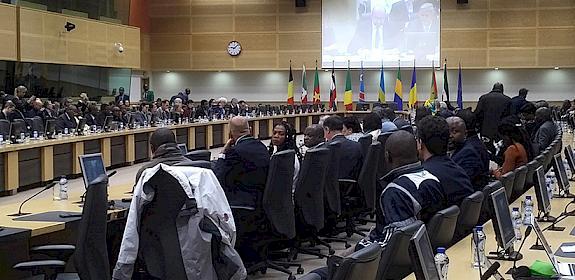Forest stakeholders meet to examine Madagascar timber
Antananarivo, Madagascar, 26th September 2014—This week, all stakeholders involved in timber extraction and management met in Madagascar to discuss the country’s timber trade resources and industry, and in particular the process required to ensure that timber harvest is carried out legally and sustainably.

The five day workshop (22nd to 26th September 2014) under the Preserving Madagascar’s Natural Resource Program aimed at “Enhancing the capabilities of Malagasy people and civil society organizations to combat the illegal exploitation of Madagascar’s natural resources" was funded by USAID and convened by TRAFFIC and WWF.
The General Secretary of the Ministry of Environment Ecology and Forest in opening the meeting noted the requirement for Madagascar’s forest to be for the benefit of the Malagasy people.
During the first part of the workshop delegates developed priority actions and identified partnerships required for Madagascar to complete the non-detriment findings “NDFs” process for the country’s precious woods, notably rosewoods (Dalbergia spp.) and ebony (Diospyros spp.).
Some urgent actions agreed in the workshops included identifying the timber species being harvested and determining population densities of commercially utilized rosewood and ebony.
With the objective of bringing transparency to Madagascar’s timber trade, the meeting also assessed the laws and policies applicable to the management of the forest resources and timber industry and in particular identifying the gaps and additional management measures required to place the country’s timber trade on a sustainable footing.
The WWF/ GFTN and TRAFFIC’s timber legality framework was used to guide this discussion.
According to article IV of the CITES convention, before permits to export species listed in annex II of the CITES can take place and export permits issued, a country’s CITES Management Authority must determine whether the export will have a detrimental impact on the species in question, that means having to make a NDF.
“Bringing transparency and sustainability to Madagascar’s timber industry is a complex process and TRAFFIC is using our experience gained from assisting other countries to work with Madagascar in developing their NDF and legality procedures,” says David Newton, Regional Director of TRAFFIC East and Southern Africa.
Delegates included representatives from the timber harvesting industry, the Malagasy CITES Scientific and Management Authorities, the Malagasy Customs, Tax and Trade services, the Anti Corruption Office, partner NGOs (WWF, WCS, CI, Missouri Botanical Garden, Kew Royal Botanical Garden), USAID, World Bank, together with Malagasy government representatives from the Ministry of Environment, Ecology and Forests at central and regional levels, plus TRAFFIC.
This news item is made possible by the generous support of the American people through the United States Agency for International Development (USAID). The contents are the responsibility of TRAFFIC and do not necessarily reflect the views of USAID or the United States Government.




